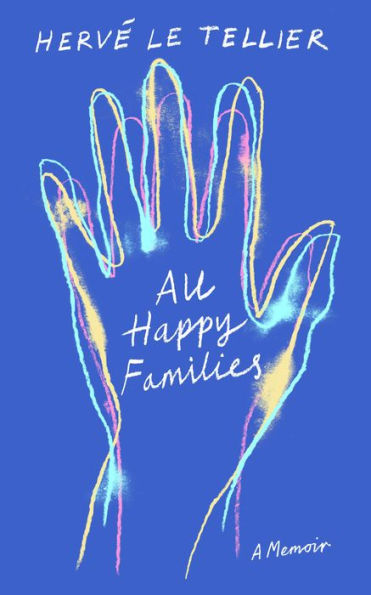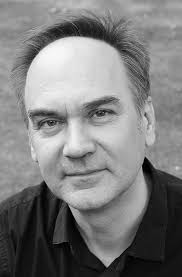“Nothing has a stronger influence psychologically on their environment, and especially on their children, than the unlived life of the parents,” said Carl Jung. It’s a pronouncement ready-made to inspire the aggrieved testimonies of offspring who blame our lacks and distresses not only on our parents’ unlived lives but on their lived lives, too. On the other hand, why shouldn’t we carp and snipe? In the very first sentences of All Happy Families, Hervé Le Tellier makes it clear that his family’s habits are fair game and that no embargo should be placed on filial comebacks:
 “So, apparently it’s scandalous not to love your parents. Scandalous to wonder whether you should be shamed because – despite your youthful efforts – you failed to find in your heart such a commonplace feeling as filial love. A child’s indifference is forbidden … An absence of filial love not only is an insult to decency, but also stabs in the back the edifice of cognitive sciences.” He seems to echo Jung when he says, “I was … the monster that, as Sartre says, adults make with their regrets.”
“So, apparently it’s scandalous not to love your parents. Scandalous to wonder whether you should be shamed because – despite your youthful efforts – you failed to find in your heart such a commonplace feeling as filial love. A child’s indifference is forbidden … An absence of filial love not only is an insult to decency, but also stabs in the back the edifice of cognitive sciences.” He seems to echo Jung when he says, “I was … the monster that, as Sartre says, adults make with their regrets.”
All Happy Families is a snappy take-down full of wit, terse observation, and a practiced management of resentment — a classic mother versus son debacle, though other relatives appear. When baby Hervé arrived in 1957, his mother Marceline (b. 1929) and father Serge Goupil had been married for seven years. Two months later, Serge took off. “It was only when I became a father myself that I realized two stray planets had collided all those years ago,” writes Le Tellier, “a perpetual victim drunk on revenge and a man relieved to be released from his responsibilities as a father.”
The up-tempo tone and the economy of phrase and chapter together abet the sense that Le Tellier, no longer assessing damages to himself, is simply enjoying the story and survival. There is no sourness but plenty of tartness. Marceline’s maternal dysfunctions are detailed, but the son treats them like aspects of a tyrannical regime, now deposed. The statues have been toppled in the public square. This dossier contains little analysis. We are told that Marceline had been excessively attached to her parents; at age 20, when her father Raphael decided to leave her mother, Marceline stopped eating and talking (he stayed). When Serge left her, she sunk into depression and lifelong joylessness. Soon after, she decamped to London, leaving the baby behind (“My mother did not witness my first steps or hear my first word”). In England, she married Guy Le Tellier (more about him later) and stayed there for almost two years.
But there’s more! She feigns affection. She denies recalling the disappearance of Jews in Paris (her lively sister Raphaëlle remembers this history crisply). She is addicted to keeping up appearances. She expresses herself crudely and speaks venomously of others. When Hervé announces that he is leaving home, she throws his belongings into the street. When Guy dies, she descends “into a period of dementia whose first manifestation was a peculiar fabrication: she convinced herself that, until Guy’s dying day, her sister had been his mistress. And overnight her husband became a ‘bastard’ and her sister most definitely a ‘whore.’”
As for Guy Le Tellier, whose name Hervé resisted taking, the disparagement flows non-stop: “Guy and I never saw eye to eye. I have no recollections of tenderness, or empathy, and I can’t have been much older than the age of reason when I decreed that he was a moron – a premature verdict, granted, but one that was not later invalidated … He was born too late to collaborate with the Nazis, too soon to torture North Africans … His conformity was so extreme it bordered on originality.”
 Pulsing under the satirical monologue is a humming hurt, not silenced so much as parked outside the theater, the engine running. Although spitefulness is part of its recipe, a text this incisive and unsparing does not arise out of mere spite. Strangely, the reader’s hurt (in other words, my own) moves into the self-reflective space only occasionally filled by Le Tellier. His spirited memories, just slightly acidic, entice one to enter. There, one encounters a monolith in the guise of a mother who has no tools for self-reflection, whose body is a bunker, a redoubt against the world:
Pulsing under the satirical monologue is a humming hurt, not silenced so much as parked outside the theater, the engine running. Although spitefulness is part of its recipe, a text this incisive and unsparing does not arise out of mere spite. Strangely, the reader’s hurt (in other words, my own) moves into the self-reflective space only occasionally filled by Le Tellier. His spirited memories, just slightly acidic, entice one to enter. There, one encounters a monolith in the guise of a mother who has no tools for self-reflection, whose body is a bunker, a redoubt against the world:
He recalls, “The tiniest disagreement cast doubt on our relationship and – or this is how I experienced it – her love for me. Terrorized by this threat, I didn’t allow myself to score even the smallest victory, and my brain invented the most bizarre way to stop itself from functioning.” Perhaps this is why All Happy Families resonates: it neither claims victory nor suffers defeat. It is written from a position of too late.
But he does say “terrorized” – which reminds me of something written by Floyd Skloot in one of his remarkable essays about his histrionic, punishing mother. “A pattern of chemically based fear response becomes embedded in the brain’s structure, a hyper-response to the least perceived danger,” he said. The child’s brain, flooded by hormones in recurring episodes of fright, changes composition, impaired. Hyper-response becomes habitual, extremes become the inevitable normal. “I’m one of the people who think parents have duties toward their children,” Le Tellier says, now perceiving his frightened boyhood self as dominated by his duties toward selfishly blinkered parents.
“I dreamed of pure, straightforward love, given unreservedly, unconditionally,” he says. As a young man, he found that love in a woman named Piette – the relationship ends tragically. With exquisite tact (but with an unspoken implication intact) he doesn’t blame his attraction and devotion to a disturbed young woman on his mother’s dark aura.
My wife and I have been watching episodes of “Finding Your Roots,” Henry Louis Gates’ program on PBS. After researching the unsuspected family histories of his guests, he always asks with a knowing smile, “How does this make you feel?” The guests, I think, are supposed to feel excited by his revelations. So I watch for the telling pauses in their responses. Le Tellier also senses their discomfiture:
 “Belonging is a slippery slope, and the mental stability of people who draw up family trees – people who want to depend on something, to look back as much as forward – has always struck me as shaky. The pretentious ramifications of these family constructs remind me of frantic imprints left in the snow by animals trying to escape predators. I feel much happier knowing that, eight hundred million years ago, the ancestor I have in common with the starfish was an animalcule with no anus.”
“Belonging is a slippery slope, and the mental stability of people who draw up family trees – people who want to depend on something, to look back as much as forward – has always struck me as shaky. The pretentious ramifications of these family constructs remind me of frantic imprints left in the snow by animals trying to escape predators. I feel much happier knowing that, eight hundred million years ago, the ancestor I have in common with the starfish was an animalcule with no anus.”
At the end of the narrative, Le Tellier repeats the gesture in his first paragraph: “There’s no greater taboo than lovelessness and estrangement.” He must admit it: there’s no love for his aged, mad mother. His is the “’shrewd delight’ derived from ‘the very causes of one’s suffering’ as described by Pessoa.” Why has he written this book? “Writing is, so to speak, my privilege, allowing me to benefit from the world several times over, and endlessly savor my own dissatisfaction.”
[Published by Other Press, March 26, 2019. 175 pages, $15.99 paperback]